Studying at a foreign university from the first person
Good day, habrovchane!
This article focuses on the differences in organization and teaching methods in higher education institutions of Georgia and Russia, as well as on the BTU, a student, which I myself am.
In addition, at the end of the article are my subjective views on improving the quality of the learning environment in educational institutions on the example of UBT, for the formation of a competent IT community.
')
Little about the university itself
The university is located in the ecologically clean district of Tbilisi, its opening took place in 2016, but in such a short time it was able to become quite popular and recognizable.
According to the plan of a multi-million dollar project, the university will include a complex of a research center.
Created to support the development of business ideas.
The center includes student campuses, a summer school for gifted children, equipped with a playground and a swimming pool, as well as the country's only artificial intelligence laboratory.
The university offers a pleasant working environment.
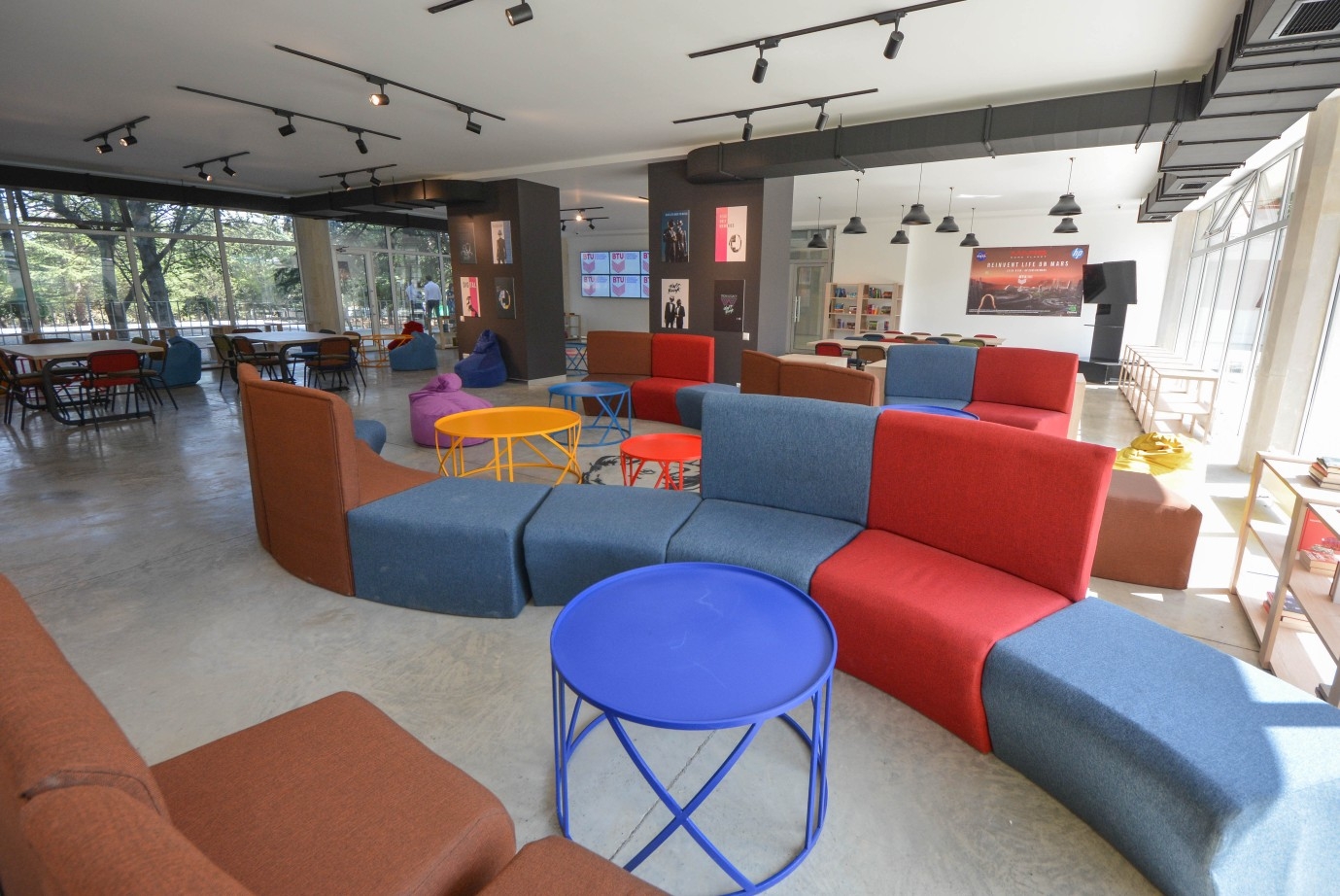
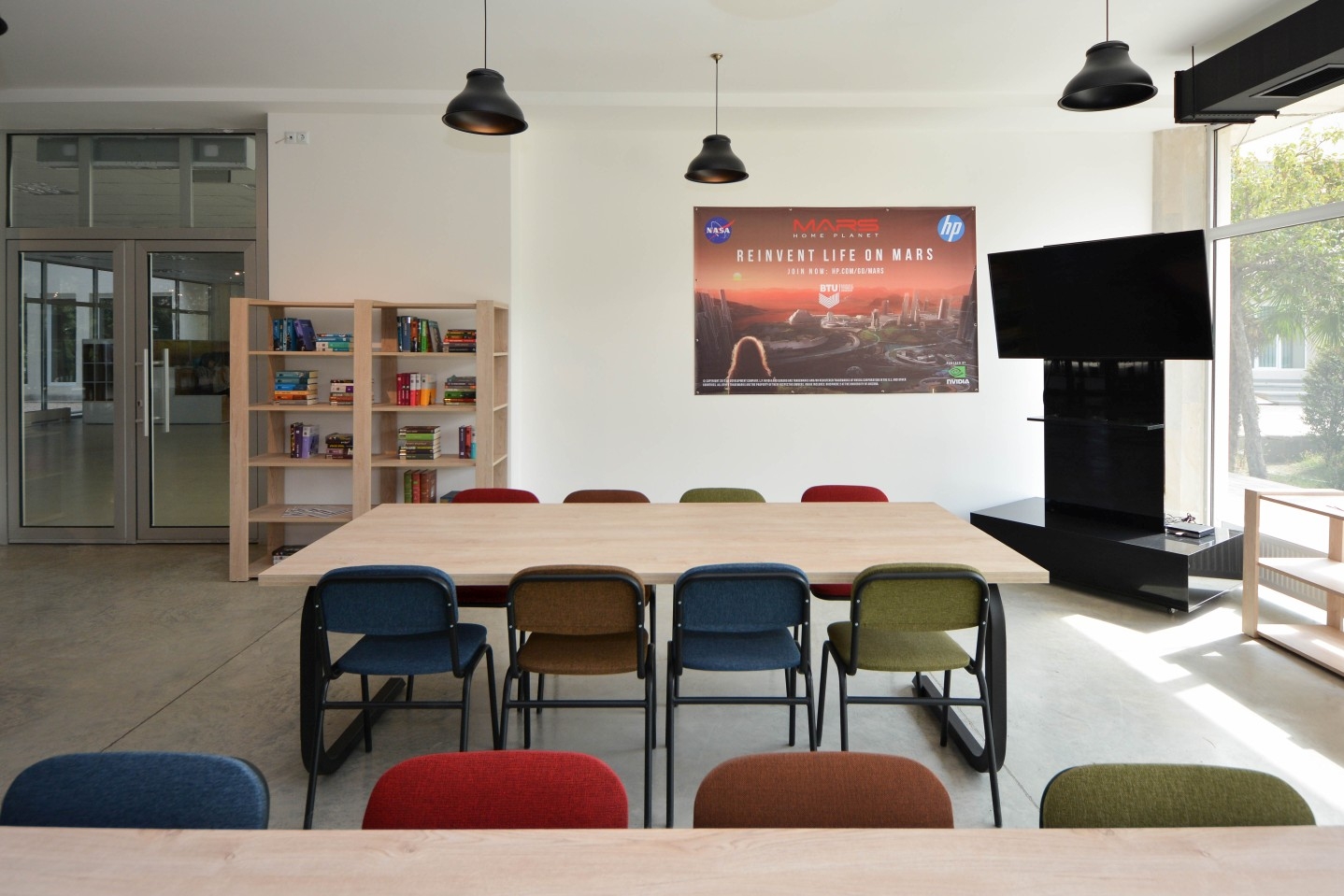
Equipped with computers library, dining room, swimming pool, stadium.
In UBT study is directed specifically to the study of programming. This factor is one of the main differences between studies in Georgia and Russia, since in Russian universities in the first years, students are often taught subjects not related to their future activities (history, philosophy, physical education).
In total, the new university has several curricula: business and administration with a bias for finance, business and administration with a bias for management and everyone's favorite IT. I will make a reservation, studying here is mixed, “IT people” study a part of subjects from business, and they, in turn, partially study subjects from our faculty.
In the first year, study is divided into two semesters and compulsory subjects are attached to the student.
Most of the lecturers consist of young professionals who easily find a common language with students, which was one of the main reasons for joining the UBT, a choice of which I have never regretted. The lecturers here are really wonderful, they are always ready to help, explain, help with difficulties. A vivid example is the help in finding errors in the code by my Favorite Python lecturer, who, by the way, volunteered to help me late at night with the help of TeamViewer.
The educational institution destroys stereotypical thoughts about today's university studies and their unsuitability, often interesting events are held: Tech hubs, hackathons, demo days for start-up ideas, there is also a platform for employing students, etc.
Almost every self-respecting university here, has its own platform for students, at UBT it is called the BTU Classroom. What is it for?
At the beginning of your studies, you will receive an e-mail with the domain of the aforementioned alma mater, then you will be bound to the Classroom account, where you can literally have everything
It is very important not to forget to say that technology has not bypassed the lectures themselves: the format has been changed for the better. Now the lectures are not outlined, students are not required to write down every word of the lecturer. All lectures are sent to students on behalf of the lecturer in the Classroom, where the student can read everything at any time and ask questions. The Syllabus file is necessarily attached to the subject, where detailed information on the subject, evaluation criteria and further topics are described.
In Georgia, the European system of transfer and accumulation of credits operates, which means that one academic year corresponds to 60 ECTS-points, a semester of 30 points, and to get a bachelor's degree, you need to gain 240 ECTS-points, that is, to study for 4 years.
Each lecturer himself chooses the criteria for assessing students; however, the total for the semester should be a maximum of 100 points. In any case, the configured Classroom system will not allow to do otherwise. From this it becomes clear that the mechanisms of work of this concept not only became an integral part of distributed education, but also greatly alleviated the fate of both students and lecturers.
I acted pretty green at the university, there was no development experience, in many respects I had superficial knowledge, there was no established goal, and it was difficult to choose something. However, thanks to one accident, over time everything was fine.
I will highlight the subject Mobile Applications will now explain why and how it is interconnected.
According to the program, we should have a study of Proto.io , photoshop images and any garbage not related to programming. Fortunately, a lecturer was attached to us, who laughed at it and began to teach us the Kotlin language, from here my sympathy for this language began, from the very first lectures he plunged us into code, showed the basics, drew a parallel between static typing and dynamic, began to explain the principles OOP.
There are two points: the first is good, immersion in practice increases learning speed and the second - the guys who came to learn from scratch did not understand anything, it would be more intelligent to give an opportunity to learn the basics of the basics - algorithms, and later start learning mobile development. Thanks to the random assignment of a guest lecturer, I fell in love with Kotlin and chose the direction of mobile development.
Learning Kotlin in Android Studio went pretty well, almost all the time I spent working at AS. At first, I could not write anything further than usual.
Over time, we started learning how to work with Firebase.
Also wrote simple forms for authorization by type:
As time went on, I continued to study in the chosen area, giving it most of the time, but the session was also approaching; the task for the final exam was to bring an application of any type. All this time I was engaged in improving the application:
The principle of operation is quite simple - when you click on the send button, the contents of the message and user data are loaded into Realtime DataBase and saved in JSON format, after which the "listener"
When you see a change in the database, it automatically adds a message to the dialog.
The exam was passed successfully, a total of 95 points out of 100.
Lastly, I would like to say that there are no budget places for the departments of information technology in Georgia and, all the more so, it will not be by a government decision. Study is paid, the minimum price for payment at each university is 2250 GEL == 55 thousand rubles, not taking into account the possibility of receiving a grant.
However, the price justifies itself, besides the main subjects there are also selective courses:
and much more.
In addition, the Georgian university is already cooperating with universities in the UK - Oxford Brookes University and Staffordshire University, which means you can get a diploma from a British university at Tbilisi University of Business and Technology.
This article focuses on the differences in organization and teaching methods in higher education institutions of Georgia and Russia, as well as on the BTU, a student, which I myself am.
In addition, at the end of the article are my subjective views on improving the quality of the learning environment in educational institutions on the example of UBT, for the formation of a competent IT community.
')
Introduction
Little about the university itself
The university is located in the ecologically clean district of Tbilisi, its opening took place in 2016, but in such a short time it was able to become quite popular and recognizable.
According to the plan of a multi-million dollar project, the university will include a complex of a research center.
- IT Academy
- School
- Laboratory and Research Center
- Technology Incubators
Created to support the development of business ideas.
The center includes student campuses, a summer school for gifted children, equipped with a playground and a swimming pool, as well as the country's only artificial intelligence laboratory.
Comfort
The university offers a pleasant working environment.


Equipped with computers library, dining room, swimming pool, stadium.
Proofs with studio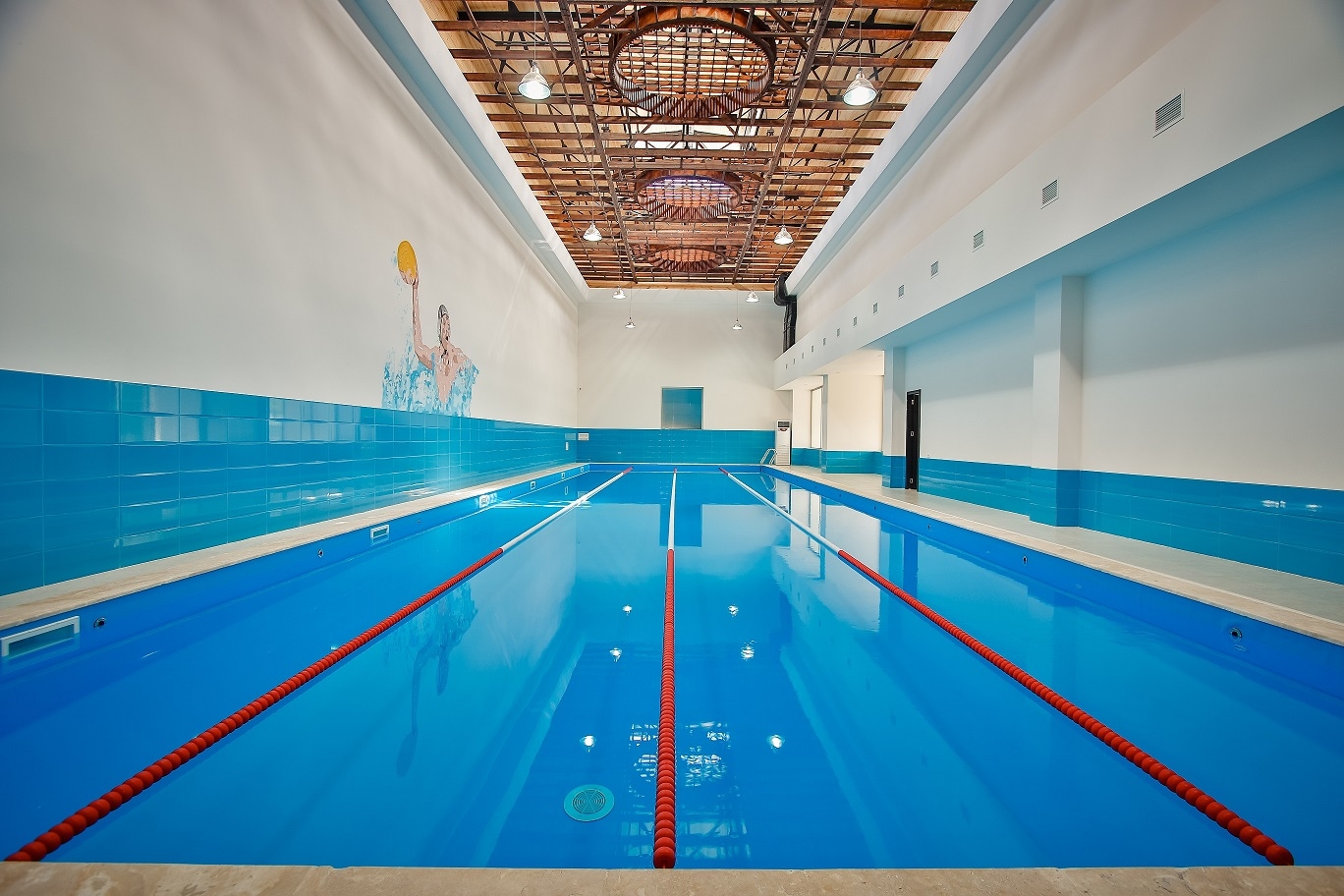
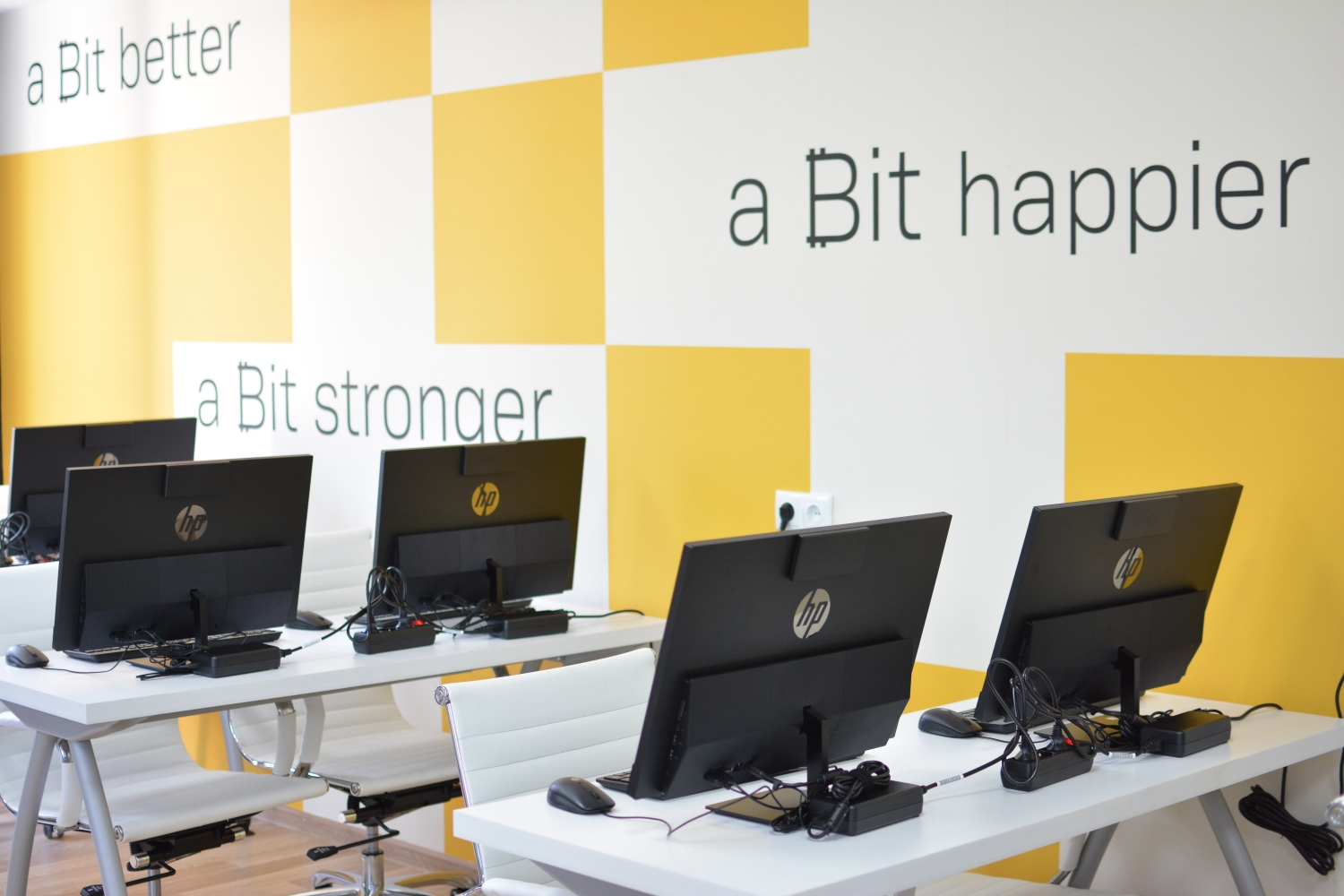

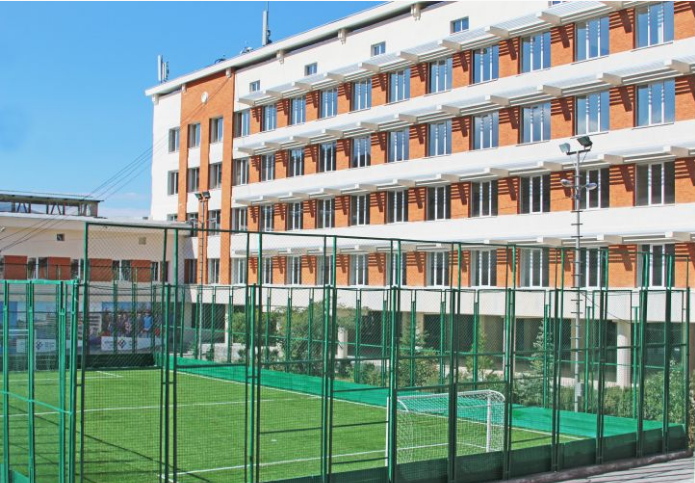




Learning process
In UBT study is directed specifically to the study of programming. This factor is one of the main differences between studies in Georgia and Russia, since in Russian universities in the first years, students are often taught subjects not related to their future activities (history, philosophy, physical education).
In total, the new university has several curricula: business and administration with a bias for finance, business and administration with a bias for management and everyone's favorite IT. I will make a reservation, studying here is mixed, “IT people” study a part of subjects from business, and they, in turn, partially study subjects from our faculty.
In the first year, study is divided into two semesters and compulsory subjects are attached to the student.
First semester
- Math 1
- Mobile applications
- Introduction to Entrepreneurship
- Principles of digital technology
- Python Programming Basics
- Computer Networking Basics
Second term
- Math 2
- Fundamentals of Management
- Database Basics
- PC architecture
- Innovation and Startup Management
- Python programming
Most of the lecturers consist of young professionals who easily find a common language with students, which was one of the main reasons for joining the UBT, a choice of which I have never regretted. The lecturers here are really wonderful, they are always ready to help, explain, help with difficulties. A vivid example is the help in finding errors in the code by my Favorite Python lecturer, who, by the way, volunteered to help me late at night with the help of TeamViewer.
The educational institution destroys stereotypical thoughts about today's university studies and their unsuitability, often interesting events are held: Tech hubs, hackathons, demo days for start-up ideas, there is also a platform for employing students, etc.
How technology has supplanted bureaucracy or online
Almost every self-respecting university here, has its own platform for students, at UBT it is called the BTU Classroom. What is it for?
At the beginning of your studies, you will receive an e-mail with the domain of the aforementioned alma mater, then you will be bound to the Classroom account, where you can literally have everything
- Detailed view of attached items
- Score table
- Payment schedule
- Section of statements that you can write online on a template or blank sheet
- Calendar with future events
- schedule
- Summary
- Letter section
- GPA Rating
Out
At the beginning of the semester
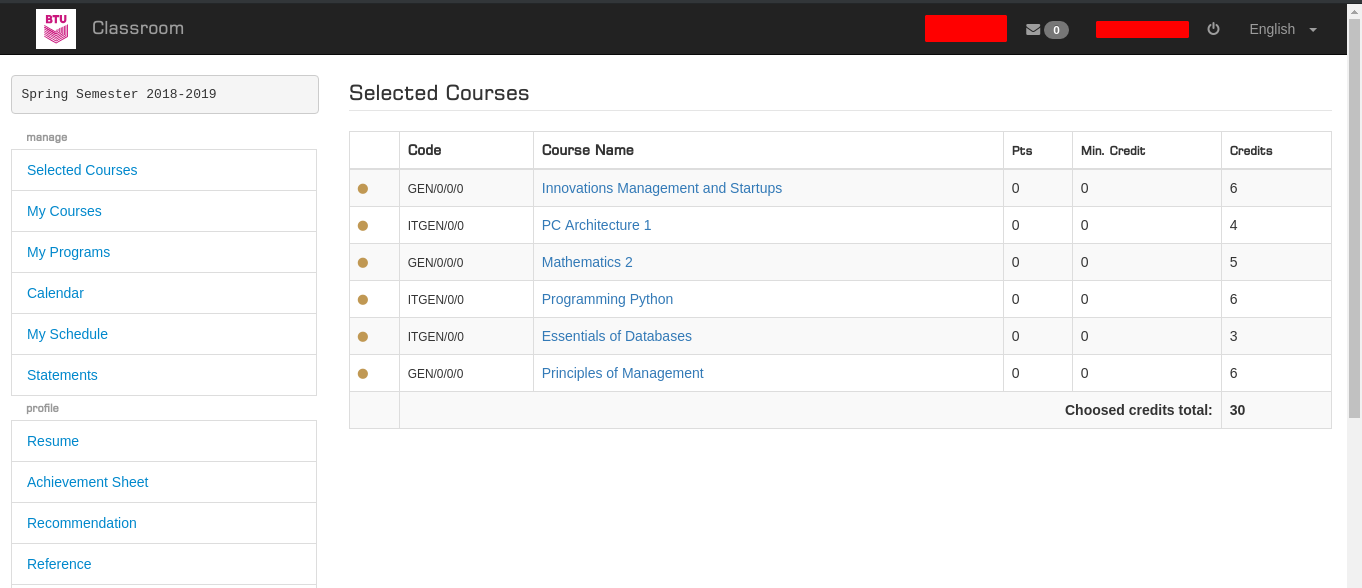

It is very important not to forget to say that technology has not bypassed the lectures themselves: the format has been changed for the better. Now the lectures are not outlined, students are not required to write down every word of the lecturer. All lectures are sent to students on behalf of the lecturer in the Classroom, where the student can read everything at any time and ask questions. The Syllabus file is necessarily attached to the subject, where detailed information on the subject, evaluation criteria and further topics are described.
Credit education system
In Georgia, the European system of transfer and accumulation of credits operates, which means that one academic year corresponds to 60 ECTS-points, a semester of 30 points, and to get a bachelor's degree, you need to gain 240 ECTS-points, that is, to study for 4 years.
Each lecturer himself chooses the criteria for assessing students; however, the total for the semester should be a maximum of 100 points. In any case, the configured Classroom system will not allow to do otherwise. From this it becomes clear that the mechanisms of work of this concept not only became an integral part of distributed education, but also greatly alleviated the fate of both students and lecturers.
What I learned in one semester
I acted pretty green at the university, there was no development experience, in many respects I had superficial knowledge, there was no established goal, and it was difficult to choose something. However, thanks to one accident, over time everything was fine.
I will highlight the subject Mobile Applications will now explain why and how it is interconnected.
According to the program, we should have a study of Proto.io , photoshop images and any garbage not related to programming. Fortunately, a lecturer was attached to us, who laughed at it and began to teach us the Kotlin language, from here my sympathy for this language began, from the very first lectures he plunged us into code, showed the basics, drew a parallel between static typing and dynamic, began to explain the principles OOP.
There are two points: the first is good, immersion in practice increases learning speed and the second - the guys who came to learn from scratch did not understand anything, it would be more intelligent to give an opportunity to learn the basics of the basics - algorithms, and later start learning mobile development. Thanks to the random assignment of a guest lecturer, I fell in love with Kotlin and chose the direction of mobile development.
Local project
Learning Kotlin in Android Studio went pretty well, almost all the time I spent working at AS. At first, I could not write anything further than usual.
Kotlin code
button.setOnClickListener{} Toast.makeText(context, "Hello world, I am a toast." , Toast.LENGTH_SHORT).show() Over time, we started learning how to work with Firebase.
User registration
signUp.setOnClickListener { val regPass = RegPass.text.toString() val regEmail = RegEmail.text.toString() if(regEmail.isEmpty() || regPass.isEmpty()) { Toast.makeText(this, "Please, Enter the Fields", Toast.LENGTH_LONG).show() } FirebaseAuth.getInstance().createUserWithEmailAndPassword(regEmail, regPass) .addOnCompleteListener { if(!it.isSuccessful){ return@addOnCompleteListener } Toast.makeText(this, "Register is Successful", Toast.LENGTH_LONG).show() val changeActivity = Intent(this, LastMessages::class.java) startActivity(changeActivity) } .addOnFailureListener { Toast.makeText(this, "Register is Failure: ${it.message}", Toast.LENGTH_LONG).show() } } Also wrote simple forms for authorization by type:
User Authorization
SignIn.setOnClickListener { val email = LogEmail.text.toString() val pass = LogPass.text.toString() if (email.isEmpty() || pass.isEmpty()) { Toast.makeText(this, "Please, enter the fields", Toast.LENGTH_LONG).show() } FirebaseAuth.getInstance().signInWithEmailAndPassword(email, pass) .addOnCompleteListener { if (!it.isSuccessful) { return@addOnCompleteListener } val changeActivity = Intent(this, LastMessages::class.java) changeActivity.flags = Intent.FLAG_ACTIVITY_CLEAR_TASK.or(Intent.FLAG_ACTIVITY_NEW_TASK) startActivity(changeActivity) Toast.makeText(this, "Login is Successful", Toast.LENGTH_LONG).show() } .addOnFailureListener { Toast.makeText(this, "Login is failed: ${it.message}", Toast.LENGTH_SHORT).show() Log.d("Fail", "Login is Failure: ${it.message}") } } As time went on, I continued to study in the chosen area, giving it most of the time, but the session was also approaching; the task for the final exam was to bring an application of any type. All this time I was engaged in improving the application:
- Added the ability to attach a photo during registration
- Display a list of registered users
- Sending messages to each other
The principle of operation is quite simple - when you click on the send button, the contents of the message and user data are loaded into Realtime DataBase and saved in JSON format, after which the "listener"
Listener structure
val ref = FirebaseDatabase.getInstance().getReference("/user-messages/$fromId/$toId") ref.addChildEventListener(object : ChildEventListener { override fun onCancelled(p0: DatabaseError) { } override fun onChildMoved(p0: DataSnapshot, p1: String?) { TODO("not implemented") //To change body of created functions use File | Settings | File Templates. } override fun onChildChanged(p0: DataSnapshot, p1: String?) { TODO("not implemented") //To change body of created functions use File | Settings | File Templates. } override fun onChildAdded(p0: DataSnapshot, p1: String?) { // } override fun onChildRemoved(p0: DataSnapshot) { TODO("not implemented") //To change body of created functions use File | Settings | File Templates. } }) When you see a change in the database, it automatically adds a message to the dialog.
Chat Photo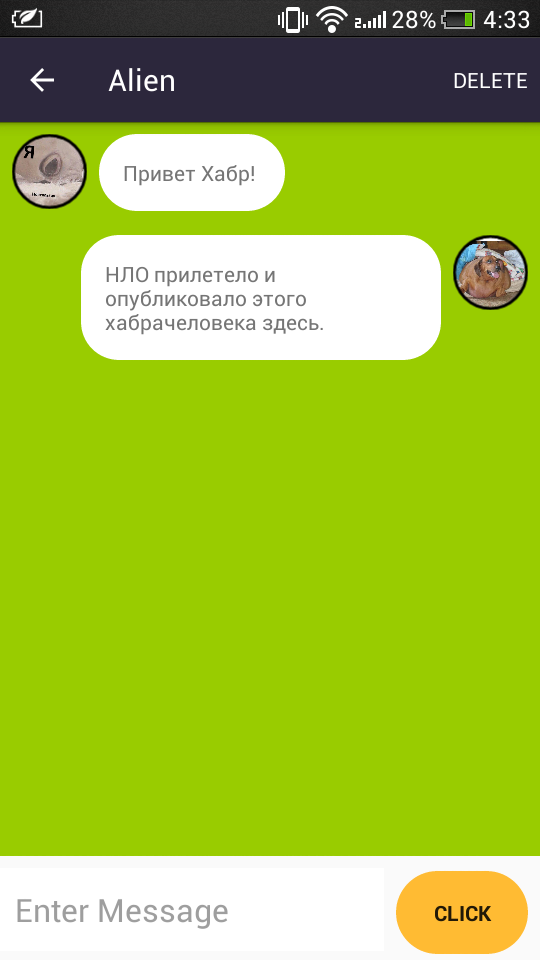

The exam was passed successfully, a total of 95 points out of 100.
Conclusion
Lastly, I would like to say that there are no budget places for the departments of information technology in Georgia and, all the more so, it will not be by a government decision. Study is paid, the minimum price for payment at each university is 2250 GEL == 55 thousand rubles, not taking into account the possibility of receiving a grant.
However, the price justifies itself, besides the main subjects there are also selective courses:
- BlockChain technology (IBM blockain)
- Programming in Visual Studio
- Introduction to Electronics and Robotics
- System Programming
- 3D Modeling
and much more.
In addition, the Georgian university is already cooperating with universities in the UK - Oxford Brookes University and Staffordshire University, which means you can get a diploma from a British university at Tbilisi University of Business and Technology.
Source: https://habr.com/ru/post/442414/
All Articles